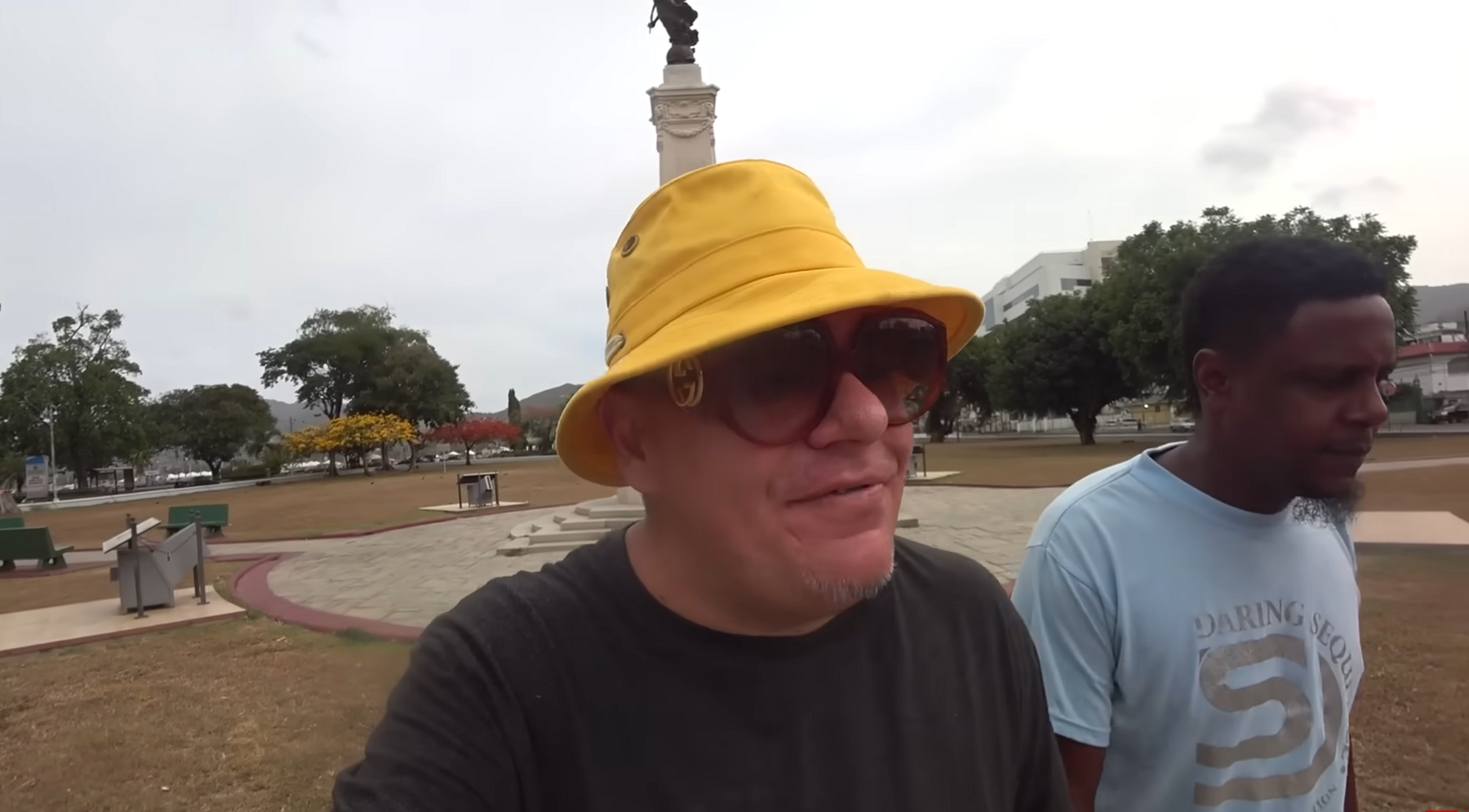Canadian vlogger accused of sedition in Trinidad

An image of Christopher Hughes, the YouTuber behind "Chris Must List", while allegedly travelling in Trinidad and Tobago.
- Published
A Canadian YouTuber accused of sedition in the Caribbean nation of Trinidad and Tobago has appeared in court and been ordered to surrender his passport.
Christopher Arthur Hughes, who posts under the account "Chris Must List", is known for videos in which he travels to dangerous places across the globe.
He was arrested on Thursday after publishing videos in which he interviewed Trinidadian gang members about their opposition to the government.
Mr Hughes was charged under the Caribbean country's Sedition Act once Trinidadian officials became aware of the videos.
On Monday, a judge in a Port-of-Spain District Court set the video blogger's bail at TT$100,000 (£11,709).
A lawyer representing Mr Hughes told the BBC on Tuesday that his client was "simply exercising his constitutionally protected right to freedom of expression and freedom of the press".
Attorney Anand Ramlogan said they intend to sue the state for breaching his constitutional rights.
In a statement on Tuesday, Global Affairs Canada said it was aware of the reports of a detained Canadian and was providing consular assistance.
The investigation into Mr Hughes began after he posted videos from Trinidad and Tobago to his YouTube page, where he has 326,000 subscribers.
The Trinidad and Tobago Police Service said in a statement that the videos featured "individuals professing to be gang members, advocating criminal activities, and using threatening language".
Law enforcement sources told BBC News that police executed a search warrant at a location in west Trinidad, where Mr Hughes was staying. They seized several items during the search, including cameras and a laptop.
Over a number of years, Mr Hughes has developed an online persona as a globe-trotting content creator. His YouTube videos allegedly show him visiting the "most dangerous" areas in a long list of countries, including Haiti, Kenya and the United States.
Videos featuring Trinidad posted to the Chris Must List social media accounts - which were deleted from his YouTube account - appeared to show Mr Hughes in areas that local authorities consider "hot spots" due to the high crime rates.
He is seen or heard off-camera interviewing people in various Trinidadian communities, including a popular entertainer, a well-known senior police officer and schoolchildren.
Some videos appear to show Mr Hughes speaking with men in Trinidad and Tobago while they brandished handguns and assault rifles.
“Want to see toys?" one man says while showing the camera his high-capacity handgun in a video shared on the Chris Must List Instagram page. "For real. We don’t play out here.”
Prosecutors could recommend a summary trial, leaving the defendant some options. If he accepts that route, the matter would be decided by a magistrate. Mr Hughes could decide to have his case reviewed by the High Court, however, which would also bring stiffer penaltiies.
With a summary conviction, Mr Hughes could expect a fine of TT$3,000 or two years in prison. However, if he's convicted in the High Court - the highest judicial body on the islands - he could face a TT$25,000 fine and five years in prison.
According to the Trinidad and Tobago Guardian newspaper, Mr Hughes has previously faced legal issues with authorities in Cuba and Somalia. The newspaper reports that he was deported from Cuba for flying a drone in Havana and deported from Somalia for throwing money at poor people.
In October 2023, the Privy Council in London, which is Trinidad and Tobago's highest appeal court, dismissed an appeal challenging the constitutionality of sections of the former British colony's Sedition Act.
Yasin Abu Bakr, who led a deadly 1990 attempt coup against the Caribbean nation's government, was among several notable people to have been charged with sedition in Trinidad.
Bakr was charged in connection with comments he made during a sermon in 2005. Seven years later Bakr's trial ended in a hung jury and a retrial was ordered. He died in October 2021, before a retrial could be held.